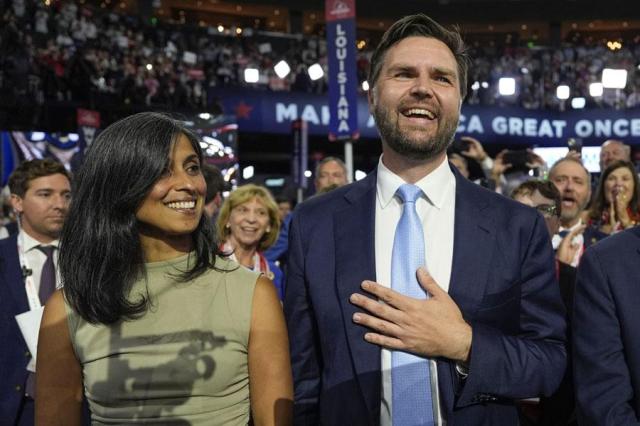
Let's start, though, with what Vance does not do for Trump, the former president and Republican presidential nominee. Vice-presidential picks sometimes come from hotly contested states in hopes of boosting the ticket in that state. But Ohio has been safely Republican since 2004, so there’s no real gain for Trump in that respect.
Vance is not especially associated with the powerful evangelical wing of the Republican Party as was Mike Pence, Trump's equally smart pick for the 2016 ticket. Trump seems to be betting that evangelicals will vote for him anyway, and they surely will, although his recent moves to distance himself from hard line pro-life positions — including a national ban on abortion — might eat into his advantages with this crucial voting group.
In fact, Vance seems to be more conservative than Trump on some social issues, potentially opening up fissures for Democrats to exploit.
How Vance bolsters Trump
Nonetheless, Vance will help Trump in two respects. One of these has to do with a crucial ideological shift in the American electorate, while the other relates to Trump's personality.
Perhaps the most important ideological change over the past 20 years is the rejection of neoliberalism, the economic doctrine that champions free trade over government regulation or national borders.
It originated from right-wing thinkers as a reaction to the New Deal coalition that was a major feature of American politics from the 1930s to the 1960s. But it became a bipartisan consensus in Washington after 1980, driving major policy changes that included the adoption of the North American Free Trade Agreement in 1993 and the bipartisan passage of welfare reform in 1996, not to mention a failed effort to partially privatize social security in 2005.
Presidents from Ronald Reagan to Bill Clinton extolled the magic of the free market and the evils of protectionism.
But neoliberalism produced winners and losers. Among the losers were many manufacturing regions in the U.S., which bled jobs for 50 years. Voters in the industrial and mining heartlands of Ohio, Pennsylvania, West Virginia and other manufacturing states never saw the promised rewards of “free” trade, and the whole idea rang hollow to an American political tradition that highly values manual work and production over commerce.
My family, incidentally, hails from upstate New York, where factory closings have blighted households since the 1970s. The first political discussions I overheard concerned the betrayal of America's working people by "parasitic" free-traders.
Neoliberalism's death knell
The last unabashedly neoliberal American president was George W. Bush. The financial crash of 2008 — a product, in part, of the hyper deregulation of financial markets — killed the idea among a healthy bloc of Americans. Ever since, both Republicans and Democrats have run against it in one way or another.
Trump brought back tariffs; Biden prefers a combination of subsidies and targeted bans on Chinese competitors, resulting in a partial return of good factory work to my family’s home region.
A successful venture capitalist from Ohio who spent much of his childhood in the Appalachian regions of Kentucky, Vance rose to fame with his book Hillbilly Elegy, a moving look at what happens to hardworking people when they have no work to do. Vance discusses despair and drug addictions in the blighted regions of Appalachia, recounts the choices and schools that enabled him to get out and calls for a kind of moral regeneration among people he obviously cares about.
With Vance at his side, Trump will reinforce his anti-neoliberal bona fides and shore up his support in crucial states like Pennsylvania, Wisconsin and Michigan. The former president may also allay the biggest barrier to his re-election: the fact that he scares moderate voters.
Trump helped Vance win his Senate seat
Why will Vance help in this regard? Simply put, the Ohio senator was a vocal critic of Trump in 2016, even suggesting that Trump might become "America's Hitler." But Trump did not attack Vance as he has many other opponents. Instead, Trump reached out to Vance — and helped the younger man win his Senate seat during an open election in Ohio in 2022.
By his own admission, Trump is not one to forgive and forget easily. Yet his embrace of Vance suggests that he can move on from disputes and criticism. And Vance, although new to politics, is a more conventional statesman than Trump in many ways.
In other words, Vance may help soften Trump’s image somewhat — just enough, Republicans hope, to win over those who fear the former president’s rhetoric and temperament. And Vance is only 39 years old, an heir apparent if there ever was one.
Trump chose well. The Democrats have their work cut out for them as the November presidential election approaches.
-------------------------------------------------------------------------------------------------------------------------
Jason Opal is a professor of history at McGill University in Canada.
This article was republished under a Creative Commons license with The Conversation. The views and opinions in this article are solely those of the author.
https://theconversation.com/donald-trump-picks-jd-vance-as-his-running-mate-heres-why-the-ohio-senator-is-a-smart-choice-234793
Copyright ⓒ Aju Press All rights reserved.


